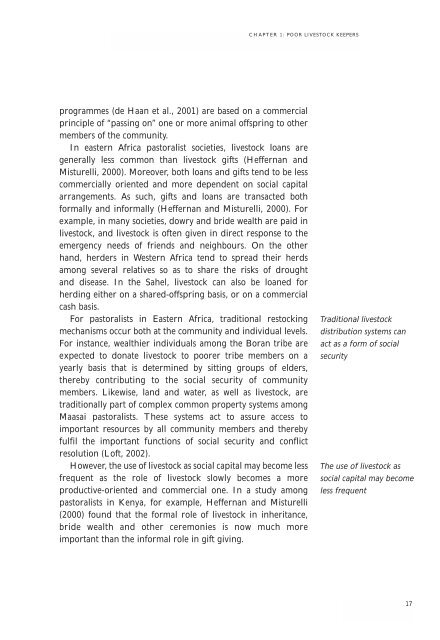Livestock Services and the Poor: A global initiative - IFAD
Livestock Services and the Poor: A global initiative - IFAD
Livestock Services and the Poor: A global initiative - IFAD
You also want an ePaper? Increase the reach of your titles
YUMPU automatically turns print PDFs into web optimized ePapers that Google loves.
CHAPTER 1: POOR LIVESTOCK KEEPERS<br />
programmes (de Haan et al., 2001) are based on a commercial<br />
principle of “passing on” one or more animal offspring to o<strong>the</strong>r<br />
members of <strong>the</strong> community.<br />
In eastern Africa pastoralist societies, livestock loans are<br />
generally less common than livestock gifts (Heffernan <strong>and</strong><br />
Misturelli, 2000). Moreover, both loans <strong>and</strong> gifts tend to be less<br />
commercially oriented <strong>and</strong> more dependent on social capital<br />
arrangements. As such, gifts <strong>and</strong> loans are transacted both<br />
formally <strong>and</strong> informally (Heffernan <strong>and</strong> Misturelli, 2000). For<br />
example, in many societies, dowry <strong>and</strong> bride wealth are paid in<br />
livestock, <strong>and</strong> livestock is often given in direct response to <strong>the</strong><br />
emergency needs of friends <strong>and</strong> neighbours. On <strong>the</strong> o<strong>the</strong>r<br />
h<strong>and</strong>, herders in Western Africa tend to spread <strong>the</strong>ir herds<br />
among several relatives so as to share <strong>the</strong> risks of drought<br />
<strong>and</strong> disease. In <strong>the</strong> Sahel, livestock can also be loaned for<br />
herding ei<strong>the</strong>r on a shared-offspring basis, or on a commercial<br />
cash basis.<br />
For pastoralists in Eastern Africa, traditional restocking<br />
mechanisms occur both at <strong>the</strong> community <strong>and</strong> individual levels.<br />
For instance, wealthier individuals among <strong>the</strong> Boran tribe are<br />
expected to donate livestock to poorer tribe members on a<br />
yearly basis that is determined by sitting groups of elders,<br />
<strong>the</strong>reby contributing to <strong>the</strong> social security of community<br />
members. Likewise, l<strong>and</strong> <strong>and</strong> water, as well as livestock, are<br />
traditionally part of complex common property systems among<br />
Maasai pastoralists. These systems act to assure access to<br />
important resources by all community members <strong>and</strong> <strong>the</strong>reby<br />
fulfil <strong>the</strong> important functions of social security <strong>and</strong> conflict<br />
resolution (Loft, 2002).<br />
However, <strong>the</strong> use of livestock as social capital may become less<br />
frequent as <strong>the</strong> role of livestock slowly becomes a more<br />
productive-oriented <strong>and</strong> commercial one. In a study among<br />
pastoralists in Kenya, for example, Heffernan <strong>and</strong> Misturelli<br />
(2000) found that <strong>the</strong> formal role of livestock in inheritance,<br />
bride wealth <strong>and</strong> o<strong>the</strong>r ceremonies is now much more<br />
important than <strong>the</strong> informal role in gift giving.<br />
Traditional livestock<br />
distribution systems can<br />
act as a form of social<br />
security<br />
The use of livestock as<br />
social capital may become<br />
less frequent<br />
17

















